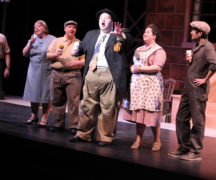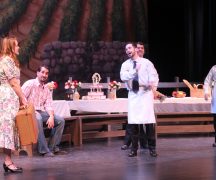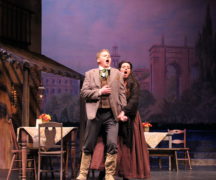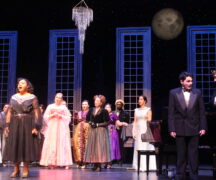By DAVID DUPONT
BG Independent News
Maybe “The Gondoliers” is just what we need about now.
With a political campaign rolling like a torrent of sludge to a messy conclusion, a frothy piece of social satire from another time is a welcomed diversion. The venerable team of Gilbert and Sullivan reminds us that being a doofus is just part of the human condition.
Doesn’t matter if you’re royalty or gondolier, you are at heart a fool. But in the world of Gilbert and Sullivan even fools can spin off a tangle of intricate rhyme that precisely delineates the absurd world they inhabit.
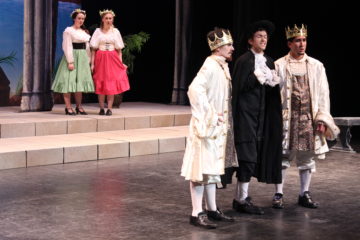 “The Gondoliers or the King of Barataria” was the team’s last hit back in the last decade of the 19th century. And Bowling Green State University Opera Theatre whips up a production that is true to the absurdist spirit of the original. The show is on stage tonight (Nov. 4) at 8 p.m. and Sunday at 3 p.m. on Kobacker Hall on campus. Advance tickets are $15 and $5 for students and children. All tickets the day of the performance are $20. Tickets can be purchased from the BGSU Arts Box Office at 419-372-8171 or at www.bgsu.edu/arts.
“The Gondoliers or the King of Barataria” was the team’s last hit back in the last decade of the 19th century. And Bowling Green State University Opera Theatre whips up a production that is true to the absurdist spirit of the original. The show is on stage tonight (Nov. 4) at 8 p.m. and Sunday at 3 p.m. on Kobacker Hall on campus. Advance tickets are $15 and $5 for students and children. All tickets the day of the performance are $20. Tickets can be purchased from the BGSU Arts Box Office at 419-372-8171 or at www.bgsu.edu/arts.
The tale is a subversive fancy, so convoluted and contrived that when the character Luiz (Aaron Hill) repeats the story to Princess Casilda (Alissa Plenzler) she’s just as incredulous as the audience, though not nearly as amused.
Casilda is the daughter of down-and-out royalty who married her off as a baby to a prince. When the prince’s family became Methodists “of the most bigoted and persecuting type,” the baby prince is whisked away by the Grand Inquisitor (Brett Pond) to Venice where he was placed with the family of a gondolier who had a son the same age. The father drank so much he forgot which boy was which, so now no one knows, except that stock figure in Gilbert and Sullivan operettas, the nurse. The entire play takes place waiting for the nurse’s arrival in the scene to settle the matter.
The prince’s father has died in a revolt, so now the prince, whichever gondolier he is, is the king of Barataria.
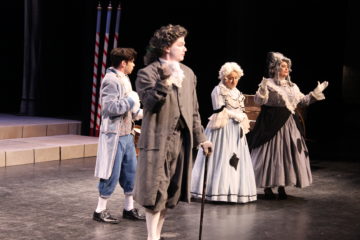 Those gondeliers Marco (Mark Tenorio) and Guiseppe (Luke Serrano) are the heartthrobs of a gaggle of farm girls, who refuse to select beaus until the handsome gondoliers decide whom to wed. The lucky girls are Gianetta (Hannah Stroth) and Tessa (Amanda Williams). But that makes prince a bigamist.
Those gondeliers Marco (Mark Tenorio) and Guiseppe (Luke Serrano) are the heartthrobs of a gaggle of farm girls, who refuse to select beaus until the handsome gondoliers decide whom to wed. The lucky girls are Gianetta (Hannah Stroth) and Tessa (Amanda Williams). But that makes prince a bigamist.
The plot revels in its own complications. No plot turn is without a detour.
The cast seems to enjoy navigating through all these ridiculous turns. Serrano and Tenorio bounce off each other nicely, at times acting as one, yet with contrasting voices. Tenorio’s voice seems perfectly matched to the ardent aria“take a pair of sparkling eyes.”
Casila’s parents the Duke of Plaza-Toro (Ben Ganger) and the Duchess of Plaza-Toro (Kate Hunt-Young) try to dominate each scene they are in. The duke is continually disappointed by the lack of pomp afforded him. He would like band. But a band, Luiz, his drummer, advises demands to be paid in advance. (To which the pit orchestra gives a huzzah.) Don’t they know me? the Duke asks. Yes, they do, Luiz replies.
The duke proudly sings of his accomplishments leading —from the rear – his troops in battle: “No soldier in that gallant band / hid half as well as he did. / He lay concealed throughout the war, / and so preserved his gore, O !”
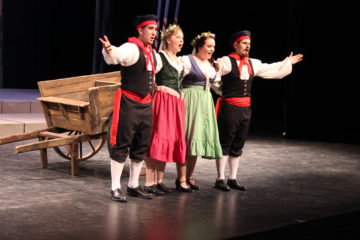 His family is in tatters when we meet them, but he and the duchess cling to delusions of grandeur. The duchess is particularly haughty. She even boasts to her daughter, in the Duke’s presence, about how she tamed her husband, “your insignificant progenitor.”
His family is in tatters when we meet them, but he and the duchess cling to delusions of grandeur. The duchess is particularly haughty. She even boasts to her daughter, in the Duke’s presence, about how she tamed her husband, “your insignificant progenitor.”
They redeem their fortunes by turning their duchy into a Limited Liability Corporation to dispense all manner of favors and titles, which they account for in “to help unhappy commoners.”
The Grand Inquisitor is another of those Gilbert and Sullivan types. Pond nails the role of the comically officious villain, who seems rather endearing despite himself. As a custodian of tradition, the Inquistitor is appalled when he discovers that the gondoliers having been set up as king (they share the title as well as a single allotment of food until it’s determine which is which) are running their kingdom as “a republic” with their court of fellow gondoliers really in control.
He slyly instructs them on the value of royalty: “When every one is somebody, then no one’s anybody!”
The final resolution isn’t so much a plot twist as a nullification of the entire plot.
Despite the satire of politics, royalty and operatic conventions being more than 125 years old, they still are amusing. Pretentiousness and dim-wittedness, especially when paired with delightfully tuneful music, never lose their appeal.
It’s too bad Gilbert and Sullivan aren’t around to apply their wit to our current political spectacle.


